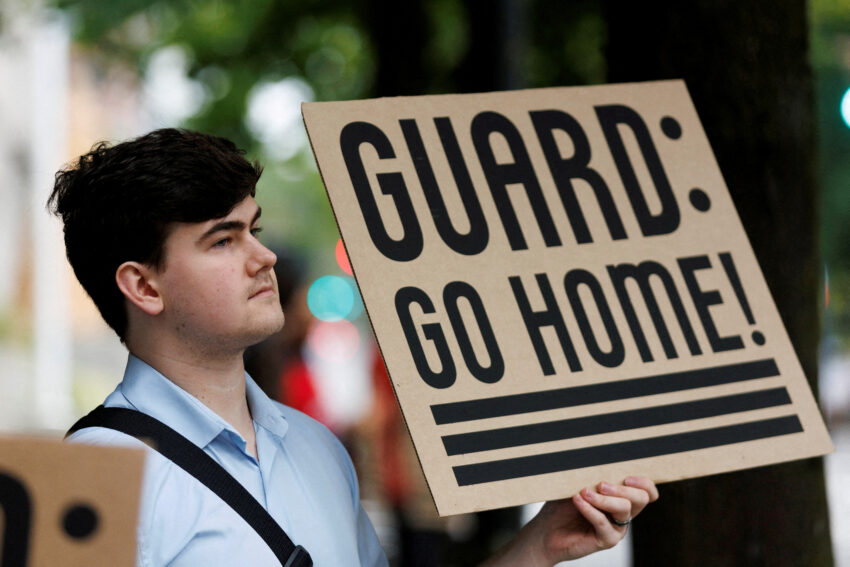**9th Circuit Court of Appeals Rules in Favor of Trump’s Deployment of Oregon National Guard Troops to Portland**
The 9th US Circuit Court of Appeals ruled on Monday that President Donald Trump can deploy Oregon National Guard troops into the city of Portland, marking a significant victory for the Trump administration. This decision comes amid the administration’s ongoing efforts to send federal forces into Democratic-led cities, despite facing setbacks in other district and appeals courts.
Judges on the three-member panel voted 2-1 to authorize the deployment. Judges Ryan Nelson and Bridget Bade, both appointed by Trump, formed the majority. The lone dissent came from Judge Susan Graber, appointed by former President Clinton.
“After considering the record at this preliminary stage, we conclude that it is likely that the President lawfully exercised his statutory authority under 10 U.S.C. § 12406(3), which authorizes the federalization of the National Guard when ‘the President is unable with the regular forces to execute the laws of the United States,’” the majority opinion stated.
### Political Flashpoint Amid Protests
The deployment has become a political flashpoint as protesters opposing the President’s key policies have clashed with law enforcement. Oregon officials and civil liberties groups argue that the administration is exaggerating the threat. Meanwhile, Trump allies insist that the National Guard’s presence is necessary to restore order.
Earlier this month, a federal judge in Oregon temporarily blocked Trump’s attempt to deploy troops to Portland. That judge described the action in her emergency order as “untethered to reality” and warned it risked “blurring the line between civil and military federal power to the detriment of this nation.” However, the 9th Circuit Court of Appeals quickly stayed that lower court’s order pending a review of the case.
### Trump’s Broader National Guard Deployment Efforts
This ruling aligns with the Trump administration’s broader push to send hundreds of National Guard troops to Democratic-led cities despite opposition from local and state leaders. Senior administration officials argue that these deployments are necessary to address an uptick in violent crime and protect against threats from protests, including anti-ICE demonstrations in various downtown areas.
Democrats, however, contend that the administration’s descriptions of violence are exaggerated and serve as a legal pretext for an effort to “federalize” cities governed by Democrats. They have pointed to declines in violent crime and have challenged the legality of these deployments in court, arguing they exceed the President’s authority as commander-in-chief.
Until the Supreme Court weighs in, lower courts bear the responsibility of handling this high-profile and politically sensitive legal dispute.
### Related Appeals Court Decisions
Other federal appellate courts have also weighed in on the issue. On Saturday, the 7th US Circuit Court of Appeals in Chicago partially lifted a lower court order blocking Trump’s federal deployment of National Guard troops in Chicago. However, the 7th Circuit’s decision stopped short of authorizing active use of the troops, allowing them instead to remain stationed at a US Army Reserve base outside the city.
### Court Arguments in Oregon
During approximately 90 minutes of arguments before the 9th Circuit panel, Trump administration officials emphasized the necessity of deploying troops to quell unrest and prevent future violence.
Judges on the panel, particularly the two Trump appointees, appeared largely sympathetic to these arguments. They noted that presidents have broad authority to deploy the National Guard when needed.
Judge Ryan Nelson remarked, “It may well be that the forces are used in an improper way, but we don’t have evidence of that.” He added, “Trump’s decision to call up the military doesn’t strike me as a glaring overuse on its face.”
The majority also expressed skepticism about arguments presented by Oregon Assistant Attorney General Stacy Chaffin. Chaffin had asserted that Trump’s assessment of violence in Portland did not justify federalizing the National Guard. She contended that the protests fall far short of meeting the legal definition of a “rebellion,” one of two conditions required for such a deployment.
“Rebellions are unusual and extreme emergencies,” Chaffin told the court, noting that many complaints from local agents revolved around being short-staffed. She emphasized that “administrative or personnel concerns are not a reason to bring the military into the streets of Portland or any other US city.”
### Court Signals Support for Trump Administration
Despite these arguments, the court appeared poised to side with the Trump administration. Judge Nelson observed shortly before adjourning, “I’m not sure even President Lincoln would have been able to authorize the use of force right now” if his actions were subjected to the “much more stringent reviewability standard” suggested by Oregon.
### What’s Next?
The 9th Circuit is among several appeals courts reviewing Trump’s plans to send National Guard troops to Democratic-led cities in recent weeks. On Friday, the Trump administration asked the Supreme Court to intervene and block the 7th Circuit ruling that currently prevents deployment of National Guard troops in Chicago.
As this contentious legal battle continues, lower courts remain the frontline in navigating the complex intersection of federal authority, state sovereignty, and civil liberties.
—
*For ongoing updates on this case and related developments, stay tuned.*
https://nypost.com/2025/10/20/us-news/9th-circuit-court-rules-trump-can-deploy-national-guard-to-portland/
